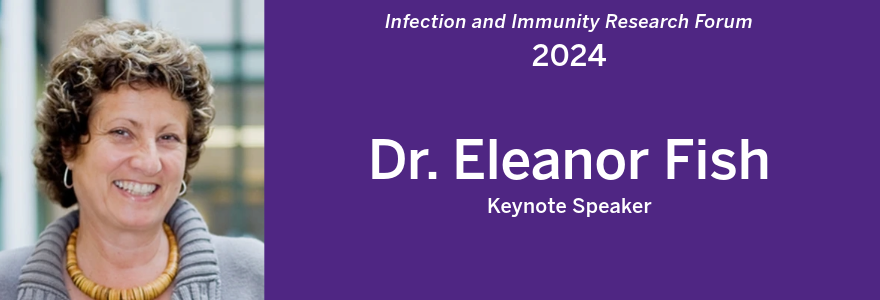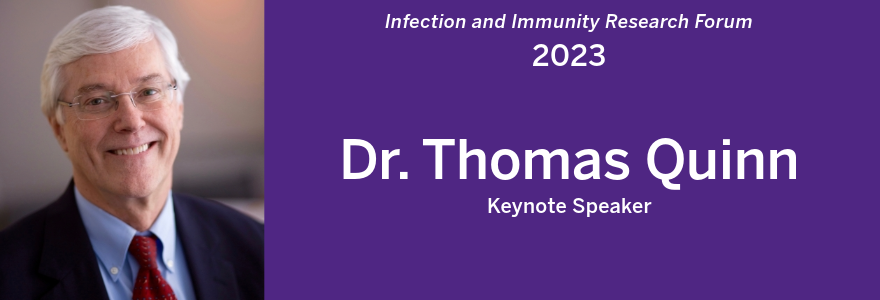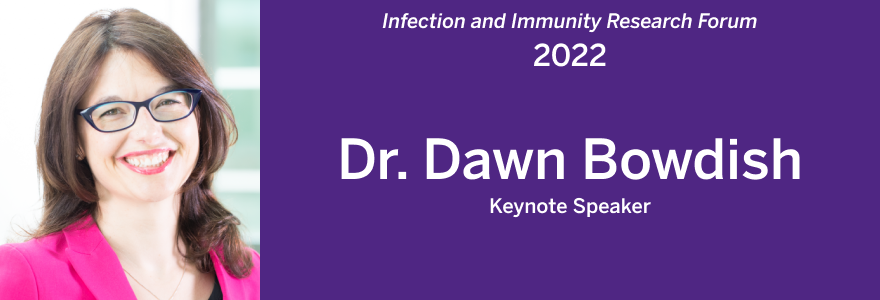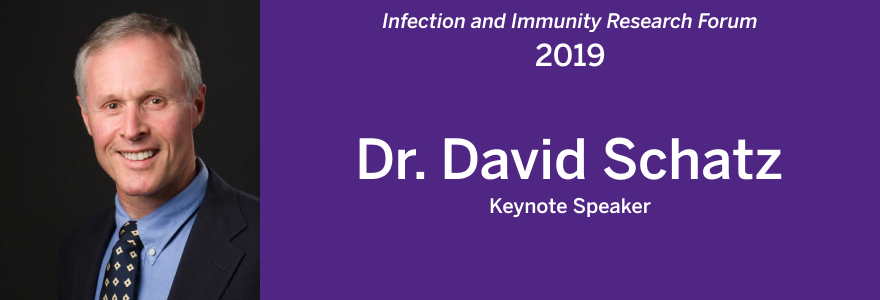Keynote Archive

Dr. Eleanor Fish is a Professor of Immunology in the Temerty Faculty of Medicine, and a Professor of Paediatrics at the University of Toronto. She also works as a senior scientist at Toronto General Hospital Research institute, and Canada Research Chair in Women Health and Immunology.
She has been acknowledged for her scientific accomplishments with many national and international awards, including Member, Order of Canada in 2021.
Dr. Fish’s research focuses on the host-pathogen interactions, and the cytokine and chemokine activities at the cellular and molecular level, specifically in the context of virus and interferons (IFNs). In 2003, her team investigated the potential use of IFN-α for treating SARS patients. This also initiated her work on investigating the use of type I IFN against other types of virus, such as H1N1 influenza viruses, and Ebola virus. During the Ebola outbreak in West Africa in 2013 to 2016, she joined the WHO working group to help for the establishment of ebola vaccines and different antiviral interventions.
During the COVID-19 outbreak, she joined the exploratory clinical study in Wuhan, China to evaluate the effectiveness of IFN treatment for COVID-19 with positive outcomes. Back in Canada, she was a member of the Canadian feral government COVID-19 Advisory Task Force.

Dr. Thomas Quinn is professor of medicine and pathology in the Johns Hopkins School of Medicine and professor of international health, epidemiology, and molecular microbiology and immunology in The Johns Hopkins School of Public Health, and professor of nursing in the Johns Hopkins School of Nursing.
In 2006 he was appointed founding Director of the Johns Hopkins University Center for Global Health. He serves as advisor/consultant on HIV and STDs to the World Health Organization, Office of the Global AIDS Coordinator (PEPFAR), UNAIDS, and the FDA.
He serves as Associate Director for International Research at the National Institute of Allergy and Infectious Diseases. He is a member of the Institute of Medicine of the National Academy of Sciences and is a fellow of the American Association for the Advancement of Science. He is a fellow of the Infectious Diseases Society of America and a member of the American Association of Physicians. He is an author of over 900 publications on HIV, STDs, and infectious diseases, and serves on multiple editorial boards.
Among his professional activities, Dr. Quinn is an alternate member of the Technical Panel of the Global Fund to Fight AIDS, Malaria, and Tuberculosis and has been an Advisor/Consultant on HIV and STDs to the World Health Organization, UNAIDS, and the U.S. Food and Drug Administration. In October 2004 he received membership in the Institute of Medicine. As the IIRF 2023 keynote speaker, Dr. Quinn gave a wonderful talk titled “A Journey into Global Health: Personal Reflections and Evolution of the Field”.

Dr. Dawn Bowdish who is the Canada Research Chair (Tier 2) in Aging & Immunity and the Executive Director of the Firestone Institute of Respiratory Health. She started her laboratory at McMaster in 2009. Her team of post-doctoral fellows, undergraduate and graduate students study how macrophages recognize and destroy Streptococcus pneumoniae, the major cause of pneumonia in the elderly. Using a combination of animal models and human samples her lab has is uncovering how ageing, and age-associated inflammation affects the development of myeloid cells, which ultimately impairs monocyte and macrophage function and how the microbiota of the upper respiratory tract becomes permissive to Streptococcus pneumoniae colonization with age. She has published over 100 manuscripts, review articles and book chapters. She has won a number of early career awards including the Pfizer-ASPIRE award and the G. Jeannette Thorbecke Award from the Society of Leukocyte Biology. She has received recognition for her teaching and mentorship in the form of the Department of Pathology’s “Best Teacher Award” and by a nomination from her trainees for the President’s Award for Excellence in Graduate Student Supervision. She has received funding from the CIHR, NSERC, ORF, NIH, the Labarge Optimal Aging Initiative and the Lung Association to understand why the elderly are susceptible to pneumonia and to develop novel preventative therapies. She sits on the Board of Directors of the Lung Health Foundation and advocates to increase research funding for lung health.

Dr. Susan Kaech is a Salk Institute Professor, Director of the NOMIS Center for Immunobiology and Microbial Pathogenesis, and holder of the NOMIS Chair. Prior to this, she was a Waldemar Von Zedtwitz Professor at Yale University in the Department of Immunobiology (2004–2018). Dr. Kaech aims to understand how memory T cells are produced during infection and vaccination, how they function, and why in some particular cases, they fail to induce long-term immunity. Her lab has been a leader in using genetic and molecular tools to identify the genes and signaling molecules involved in generating two specific types of memory T cells, CD4 and CD8, from precursor cells during both acute and chronic viral infections. She and her team discovered more than half a dozen important regulatory genes, as well as several types of key molecules called cytokines, which influence memory T cell development. Dr. Kaech is also interested in how T cells are metabolically regulated, and how their differentiation and function can be altered by nutrient availability during infection and in tumors. In particular, she seeks to learn how T cell behavior is suppressed by tumors, in order to create better therapies for cancer using the body's own immune system—an innovative and rapidly moving field called cancer immunotherapy.
We are pleased to announce the keynote speaker for this year will be Dr. David Schatz, a professor of Immunobiology at Yale University. Dr. Schatz has published over 160 co-authored articles and is the recipient of the Rhodes Scholarship among many others. Dr. Schatz is the discoverer of RAG1 and RAG2, as well as the two levels of somatic hypermutation regulation. His research interests are the mechanisms underlying V(D)J recombination, somatic hypermutation, and how these natural processes can contribute to lymphomas and leukemias.
Dr. Ostrand Rosenberg is a Professor of Biology and the Robert and Jane Meyerhoff Chair at the University of Maryland. She has been a member of the American Association of Cancer Research and the American Association of Immunologists. Dr. Suzanne Ostrand Rosenberg has more than 40 years of experience studying cancer immunology with the goal of manipulating the immune system to reject cancer cells. During this time she has made several pivotal discoveries in the field. Early on she was one of the first researchers to demonstrate that CD4+ T cells are essential for immune mediated tumor rejection. Her lab was also among the first to discover that myeloid derived suppressor cells are found in all cancer patients and present an obstacle to cancer immunotherapies. Dr. Ostrand-Rosenberg is currently working on deactivating the suppressive activity of these myeloid cell populations creating a more favorable environment for immunotherapy in cancer patients.

Dr. Ann C. Palmenberg is a Professor in the Department of Biochemistry and the Institute for Molecular Virology at the University of Wisconsin-Madison. In recognition of her expertise, Dr. Palmenberg was elected a Fellow of the American Academy of Microbiology in 2009. This is the honorary society of the American Society for Microbiology and whose Fellows include Harry Eagle and Jonas Salk. Dr. Palmenberg is one of North America’s leading picornavirus researchers having published notable papers on encephalomyocarditis virus and human rhinovirus (AKA the cause of the common cold) in esteemed journals including Science, Nature and Cell (see selected publications below). Her current research focuses on host-cell interactions between rhinovirus and the infected cell. We are pleased to have Dr. Palmenberg speak at the 12th annual IIRF about her research and experiences in science.











